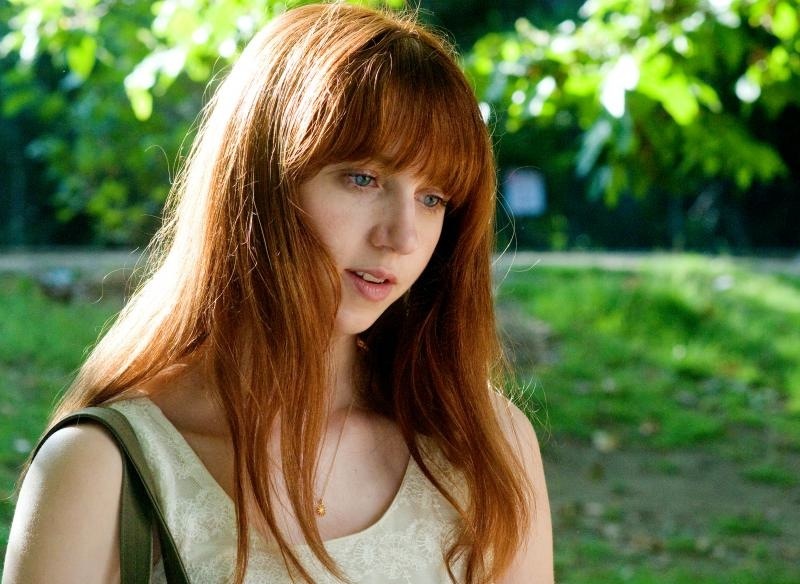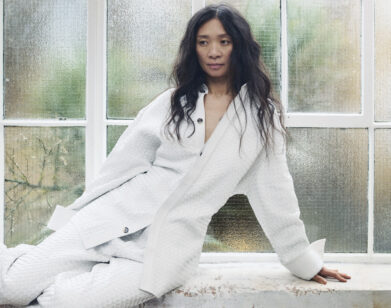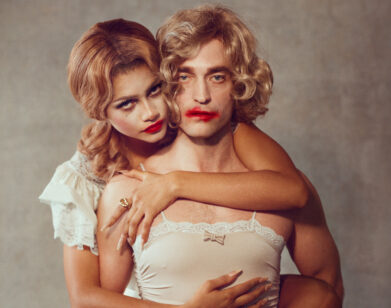Zoe Kazan’s LA Dream Girl

ABOVE: ZOE KAZAN AS RUBY IN RUBY SPARKS. IMAGE COURTESY OF MERRICK MORTON/FOX SEARCHLIGHT
In Zoe Kazan‘s first feature as writer and actress, she explores the somewhat maddening task of invoking the muses. A modern interpretation of the Greek Pygmalion myth, in which a sculptor falls in love with the product of his own creation, Ruby Sparks follows the creative and romantic ineptitudes of Calvin, a young, LA-based novelist attempting to produce a follow-up to his first, critically lauded work. After fruitless therapy sessions and unwanted romantic advances, and purchasing a puppy like a quick pick-me-up, Calvin retreats into his dreams, in which he envisions his perfect girl. After he writes her story on his typewriter, Ruby (Kazan) simply appears in Calvin’s life one morning, munching on cereal in his kitchen.
Magic and surrealism aside, the rub is that while Ruby is a product of Calvin’s invention, she lives and feels as an autonomous being with her own wants and needs, but is subject to change (be it her mood or desires) at Calvin’s whims—he can make her speak French, come home, or change her mind, all by the clack of his typewriter.
Kazan crafts a story that is as much about the search for creativity as it is about coming to terms with the reality of relationships and the ups and downs that accompany them. Directed by Valerie Faris and Jonathan Davis (Little Miss Sunshine) and starring Kazan’s real-life boyfriend Paul Dano as Calvin, Annette Bening, Antonio Banderas, and Steve Coogan round out the cast and provide a much-welcomed dose of comedic relief.
Kazan, the daughter of screenwriters and granddaughter of director Elia Kazan (A Streetcar Named Desire, On The Waterfront), has steadily made a name for herself in the arenas of stage, television, and film, appearing on Broadway in A Behanding in Spokane and The Seagull, and acting in HBO’s Bored to Death, opposite Leonardo DiCaprio in Revolutionary Road, and in Josh Radnor’s portrait of twentysomething ennui, Happythankyoumoreplease. Last fall, she premiered her first play produced in New York, the familial drama, We Live Here, and is slated to appear in Joss Whedon’s In Your Eyes and in Some Girl(s), alongside Kristen Bell and Adam Brody, later this year.
Interview chatted with the 28-year-old actress, playwright, and screenwriter at the Crosby Street Hotel in New York about her writing process, Calvin’s transformation, and seeing LA onscreen.
COLLEEN KELSEY: How did you first arrive at the concept for Ruby Sparks?
ZOE KAZAN: I’ve always really been interested in the Pygmalion myth and both what it has to say about creativity and what it has to say about relationships between men and women. I’d been thinking about what I would want to do with that if I was going to write on that theme, and one morning I woke up and Calvin and Ruby were in my head. So, like Calvin, I woke up with a dream, and wrote it down.
KELSEY: How long did the process take you for writing the screenplay?
KAZAN: It was actually kind of fast. I wrote the first 20 pages in the summer of 2009, and then I didn’t feel like I had the concentration at that time to finish it. Also, I sort of knew what the broad comedy version of the movie looked like, but I knew that that wasn’t what I wanted to write, so, I felt like, “I have to be in an emotional place where I’m prepared to write this.” So I put it away, and then in the spring of 2010, like six months later, I felt ready. I wrote in two and a half, three weeks, and then I did a polish of it and sent it off to producers, and then Jonathan [Dayton] and Valerie [Faris] came onto the project in October 2010, and I rewrote it for them for about nine months, and then we were in production.
KELSEY: You’ve done quite a bit of theater work, in addition to films, on both the writing and acting ends. Do you approach the two differently?
KAZAN: I think for acting, one informs the other. Obviously, they require really different kinds of discipline and really different kinds of work. It’s more along the same continuum, for me. In terms of writing, though, it feels like a totally different thing. I think film writing, you’re thinking in pictures, and stage writing, you’re thinking in dialogue. In film writing, it’s also, you only get so many words, so everything has to earn its place in a really economical way. I think for stage writing, you have more leeway.
KELSEY: When you first developed the script, did you intend for you and Paul to act in it?
KAZAN: Very quickly, I started writing it and I was about five pages in and I showed it to Paul and he said, “Are you writing this for us?” As soon as he said it, it occurred to me that that’s what I was doing, but at first it was just that the characters were so clear, and then I had a lot of fun getting to, less writing for myself, but getting to think about writing for Paul was really fun.
KELSEY: Jonathan and Valerie give the film such a distinctive look. How did they first come onboard?
KAZAN: When I was in the first thrust of writing, those first 15, 20 pages, Paul said, “You know, Jonathan and Valerie would be the perfect people to direct this,” and I totally agreed, partially because they’re a man and a woman and I feel like having that masculine and feminine perspective behind the camera was something really unique that they could bring, and also, I just loved their work so much. I feel like they’re really capable of surprising choices and maintaining a very delicate tone, and so I thought they would just be perfect. And then, when our producers came on, when we asked them who their first choice to direct would be, they said Jonathan and Valerie, and so we just took a gamble and sent it to them, and they agreed to do it.
KELSEY: How do you transition from writing a character to embodying it?
KAZAN: That’s a good question, you know, I think that’s a huge jump. I was rewriting for production, and doing costume fittings, and going to auditions, and there was so much activity right before we started shooting that I wasn’t even really thinking about playing it. And you know, like two weeks beforehand, I was like, “Oh, my God, I need to start preparing!” The nice thing is that you’ve done a lot of your homework already. I think a large part of an actor’s job in preparation is just making the words feel organic to them, and obviously they came out of me, so they felt organic to me already. And then I think then it was all about clearing away all the other voices so that Ruby’s voice was the only voice I was hearing, and just letting her come through and not trying to impose something on her.
KELSEY: The interesting thing about Ruby herself is that while she is a product of fantasy, she’s a completely fleshed-out, three-dimensional character. That’s not typically the case with romantic comedies. Most characters tend to be archetypes.
KAZAN: That was completely our intention. Jonathan and Valerie and I talked about wanting to make her feel absolutely real, partially because, then later when he starts to change her, we wanted the audience to feel the gravity of that, and if she was just an idea of a person, I don’t think they would feel that.
KELSEY: I think it’s safe to say that Calvin has some control issues…
KAZAN: [laughs] Yes! Sure.
KELSEY: And that the film is about his search for creativity, but also his maturing into understanding what a real relationship is and how it transforms. I saw that not only with the trajectory of his relationship with Ruby, but also when his ex-girlfriend Lila [Deborah Ann Woll] comes back, and you see their dynamic from another point of view. Do you think that Calvin is forever changed with how he’s going to deal with romantic partnerships?
KAZAN: I hope so. I feel like he goes to such a dark place and he has to destroy a part of himself, essentially, that I hope that someone could only learn from that and in recovering from that, become changed. I hope he’s capable of change.
KELSEY: Was there any particular reason why you set the film in Los Angeles rather than in New York?
KAZAN: It’s a really good question! You know, I was saying, the thing that seems to be the biggest leap of fiction to me is that a novelist lives in LA instead of New York. [laughs]
KELSEY: I know! There are so many New York tortured-writer stories.
KAZAN: I think part of it was that I’ve never seen that story. I grew up in LA, and I don’t think I’ve seen LA onscreen in a way that felt real to me. There are definitely movies, but they are few and far between. I wanted to see a movie that was set in LA that wasn’t about the film industry. Part of it was that I was homesick—I was writing it here and missed LA—and the other thing is that LA is such a lonely place to be alone. In New York you can just walk out and be among people. You’re on the subway among people, you go to cafés, you can talk to people. In LA, no one talks to each other, you’re in your house, you’re in your car, even when you take walks there’s no one on the street, and I just really wanted to isolate him.
KELSEY: I think that was a really important part of accessing Calvin’s state of mind. Jonathan and Valerie did such a beautiful job of contrasting the coldness of his home with the landscape and making it look really, really lush.
KAZAN: They’re amazing.
KELSEY: I’ve actually never been to LA.
KAZAN: It’s a beautiful, strange place.
RUBY SPARKS OPENS IN LIMITED RELEASE TOMORROW, JULY 25TH.






